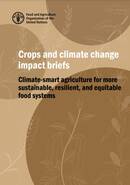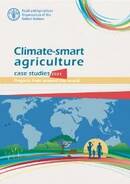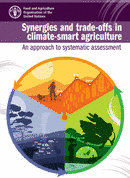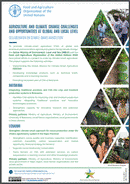Publications
This publication describes climate-smart agriculture (CSA) case studies from around the world, showing how the approach is implemented to address challenges related to climate change and agriculture. The case studies operationalize the five action points for CSA implementation: expanding the evidence base for CSA, supporting enabling policy frameworks, strengthening national and local institutions, enhancing funding and financing options, and implementing CSA practices at field level. The publication provides examples of the innovative roles that farmers, researchers, government officials, private sector agents and civil society actors can play to transform food systems and help meet the Sustainable Development Goals; it also demonstrates how these actors can collaborate. The case studies discuss context-specific activities that sustainably increase agricultural productivity and incomes, adapt and build resilience of people and food systems to climate change, and reduce and/or remove greenhouse gas emissions where possible.
This publication analyses of the synergies and trade-offs that can occur within climate-smart agriculture (CSA), more specifically between its three pillars: (i) sustainably increasing productivity and incomes in agriculture, (ii) building resilience of and adapting food and agriculture systems to climate change, (iii) reducing/removing greenhouse gas emissions, where possible. The aim of this analysis is to develop a systematic characterization of possible synergies and trade-offs in CSA, as well as provide a tool to guide CSA practitioners through the assessment of synergies and trade-offs during the design and planning of CSA strategies or interventions. The ultimate objective is to support strategic decisions that enhance synergies and reduce trade-offs to achieve better results for investments in CSA.
To promote climate-smart agriculture (CSA) at global and local level and to transform the agricultural system under climate change, the Italian Ministry of Environment, Land and Sea of Italy (IMELS) and the Food and Agriculture Organization of the United Nations (FAO) have joined their efforts in a project to scale-up climate-smart agriculture. This brochure was made to briefly explain what is the FAO - IMELS project (commonly named Italian project) and how it contributes to the Climate-Smart Agriculture approach, also due to its two implementations in Botswana and Ecuador.
The main objective of this training module is to help project designers and implementers develop their capacity to integrate gender issues in CSA projects and programs. As a result of the training, learners are expected to have a better understanding of the gender roles in CSA and their critical impact on project outcomes and sustainability. The training will also provide different methods and tools enabling learners to identify, formulate, implement, monitor, and evaluate gender-responsive actions and practices in CSA development projects.





